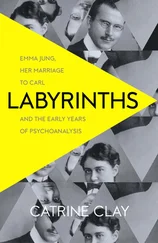“So how’s it going, Linda?” she asks, perching on the stool across from where I sit, her eyes wide under thick, long eyelashes.
“Well, I’m still on my feet,” I say with a meager smile.
“Phenomenal, isn’t it?”
“Most days,” I reply.
She nods, sagely. There’s a small imprint on her nose that I’m sure once held a piercing.
“Having a hard time? Let me say first, it’s very normal for survivors to have a difficult time reentering their lives in the beginning. You’ve been through a very intense physical and psychological trauma, even if it wasn’t in this particular body.” She speaks in the way I imagine a sorority girl might when explaining the house rules to new pledges. But I listen with rapt attention because I know her manner belies an almost savant-like understanding of medicine.
“I’m pregnant,” I say, all at once, the way I couldn’t with Connie on the street. And then I think I’ve said absolutely the wrong thing, because Dr. Shah’s brow creases so severely I wonder if it makes her forehead ache.
“Pregnant,” she says, and then everything in her forehead smoothes out and she smiles, a little less exuberantly than before, but no less genuinely. “That’s wonderful Linda. Congratulations.”
“The problem is, I think,” I say, stumbling a bit in the middle. “I think maybe I don’t want to go through with it.”
“With the pregnancy?” she asks, as if I could be talking about anything else.
“I think it’s too soon after the transfer,” I say, trying to remember all the things that Connie said that made her argument seem so bulletproof. “I’ve only just gotten my life back. I don’t think I can handle any more complications.”
Dr. Shah taps her forefinger to her lips. I look down at her from my perch and wonder if I’ve ever seen the bubbly light in her so dimmed.
“The thing is, Linda,” she says, looking up at me with her huge, earnest eyes. “I don’t have authorization to allow you to terminate a pregnancy.”
“What?” The examination room seems to be growing colder by the minute, the harsh bite of alcohol in the air chilling the insides of my lungs.
“I would have to get authorization from the SUBlife committee to even prescribe the most basic of medications to you. I don’t have authorization to perform a surgical procedure, much less terminate a pregnancy.” It’s as if she’s explaining the rules of bridge. It’s all I can do not to pull on my clothes and run from the room.
“Can you get authorization?” I ask, my voice a little more pinched than a moment ago.
“Linda, the sort of data this pregnancy provides the study is literally unprecedented. I can’t see them approving anything that would limit the sort of knowledge they could gain from this.”
“It’s my body,” I whisper. She nods, looking a little sick.
“Of course it is, of course it is. But in the paperwork you signed before the transfer, you specifically consented to allow the SUBlife committee discretion in your medical treatment for the next five years.”
“My husband.”
“What?” she asks.
“My husband signed that paperwork. Not me.” I must be pale. I must be shaking. Something. Because she rises quickly from her seat, placing a steadying hand on each of my shoulders.
“Think of this as an opportunity, Linda. To begin again with your family. This could be the beginning of something…” she searches for the word, and breaks into her cheerleader grin again. “Something great.”
I consider how wonderful it must be, to be a brilliant young doctor, now that we live in the time of a miracle cure. When there are fewer lost causes, when nothing is incurable. I think of the future, a future in which people will only fear the most acute sort of deaths. Car accidents. Gunshot wounds. Unexpected, irreversible conditions. How lucky she is to be able to administer the cure without needing it herself.
I nod, giving her my well-practiced smile. Make her think it will be all right, that it could even be great, though none of it is true. It’s the story I’ve told myself every day since the transfer, but none of it is true.
The story breaks on a Thursday morning and it takes me a moment to realize it’s Sam’s name in the byline. I’m too caught up in the fact that it’s happened, so soon, and so completely. The Chicago Tribune has published a piece about the Northwestern SUBlife trials. And worse, it names Congressman David Jenkins as one of the study’s participants.
I’m actually a few paragraphs into the article, skimming through a brief description of the transfer procedure and details about David’s illness, before I recognize the writing. I’ve read so much of Sam’s work — everything, really, that he’s published since we’ve been together — that the voice is immediately familiar. I barely have to glance at the byline to know that it’s him.
And, of course, it’s all there. Everything I’ve mentioned to Sam in the months since the transfer, all of those little details I’d foolishly assumed I could trust him to keep secret or, at the very least, not write about for the papers. Mercifully, the rest of us are only mentioned in passing, as the “three other members of Jenkins’s support group, each with their own terminal or degenerative condition.” But David is drawn in pitiless detail, everything from the number of times he’s voted to cut Medicaid, to allegations that he used his political influence to buy his way into the pilot program.
And there’s more. Things I didn’t know, paragraphs I have to re-read standing up at my table after I’ve kicked over the nearest chair. Confirmed phone calls from David to an official at the FDA. Threatening calls. Mounting evidence that David has been trying to keep SUBlife from being approved.
I stuff the paper into my purse and bang my way out of the apartment. There is only one place in the world I can be right now. And even though group doesn’t begin for another three hours, I have the sneaking suspicion that I won’t be the only one arriving early today.
There are already protesters outside the hospital. It’s almost impressive that they can congregate so quickly, considering the story just broke this morning. As if they’re all part of some sort of Evangelical call-tree, like mothers who phone each other when school is cancelled because of snow. Maybe all it takes is a phone call to mobilize twenty people who don’t mind screaming at strangers in the name of Jesus.
They have signs. Some of them hold the newspaper in front of them, David’s campaign-smile showing in the muddy black and white of its photo. Others have hurriedly painted posters in the same shade of bright red. Abomination. Sin. Satan. I can only see single words, something in my brain has clicked off, something that has made it difficult to comprehend anything beyond single words and the mass of angry voices being hurled at anyone who dares enter the hospital. Adrenaline, I think, feeling my heart still pounding as I get through the doors and escape into an elevator. Fight or flight. It’s not important to be able to read when you’re running for your life.
I’m the last to arrive, in fact. Even Dr. Bernard sits with his hands cupping his jaw, waiting for me to appear. I feel like I might be late, forgetting for a moment that none of us are supposed to be here yet, not for hours, but I am too cracked open to think clearly. David is on his feet, though, and my vision tunnels around him. I fish the paper out of my purse.
“What have you been doing?” I ask, my voice so much calmer than I would have expected.
“I could ask you the same thing,” he replies, not calm, not even a little. Almost shouting, stepping toward me. I throw the paper at him, halting him as he bats it away.
Читать дальше












